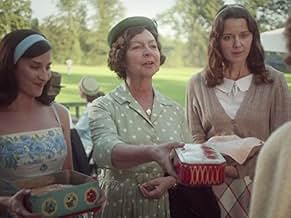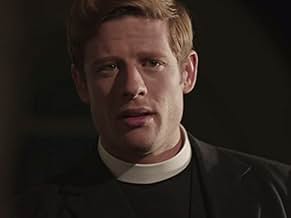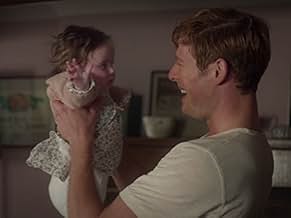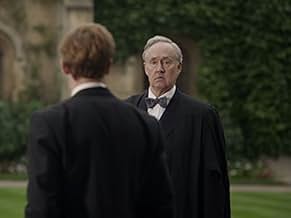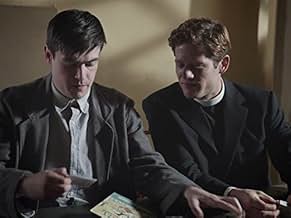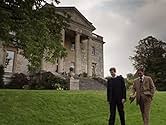Grantchester
- TV Series
- 2014–
- Tous publics
- 45m
A Cambridgeshire clergyman finds himself investigating a series of mysterious wrongdoings in his small village of Grantchester.A Cambridgeshire clergyman finds himself investigating a series of mysterious wrongdoings in his small village of Grantchester.A Cambridgeshire clergyman finds himself investigating a series of mysterious wrongdoings in his small village of Grantchester.
- Awards
- 3 nominations total
Browse episodes
Featured reviews
I have been an avid watcher of this programme for a number of years. I thought James Norton made a fabulous hunky, tortured vicar in the first incarnation of the series, but I was less pleased with Tom Brittney. We now have a third vicar, Rishi Nair, whom I think will infuse the role, and the show, with a bit more spice. I'm certainly hopeful!
What I like about the show: -It is light entertainment that always circles back to good values, after casting a light on questionable ones.
-British series use actors that look like real people. I like seeing wrinkles and a bit of chunkiness, balding men, a career woman with one arm, and homely looking folks.
-The locations are gorgeous.
-The acting is good, especially Al Weaver as Leonard. And Robson Green is the perfect actor for his role. I can't imagine anyone else in it, and am relieved they don't cycle through detectives like they do vicars.
Watching the series, of course, requires a generous helping of suspension of disbelief, as do most series in this genre (how many murders, really, can happen in a place this small, week after week?) and I can overlook some aspects that aren't quite in line with the times the series is set in, except the language. Somehow, I guess because the show is accurate with props and costuming, I expect the same of dialogue. But in this 9th season, Geordie is described as having "a thing for vicars", and his daughter calls everything "a drag". I don't think either of these idioms were all that popular in the early 60s, when (I believe) this is taking place. The new vicar also speaks of receiving envelopes through his mail slot containing "quotes" from the Bible, which any self-respecting vicar would refer to as passages or verses of scripture, certainly not quotes. These are irksome oversights, and I hope they employ somebody to watch out for these mistakes.
All that aside, I look forward to finding out what Alphy and gang get up to this season!
What I like about the show: -It is light entertainment that always circles back to good values, after casting a light on questionable ones.
-British series use actors that look like real people. I like seeing wrinkles and a bit of chunkiness, balding men, a career woman with one arm, and homely looking folks.
-The locations are gorgeous.
-The acting is good, especially Al Weaver as Leonard. And Robson Green is the perfect actor for his role. I can't imagine anyone else in it, and am relieved they don't cycle through detectives like they do vicars.
Watching the series, of course, requires a generous helping of suspension of disbelief, as do most series in this genre (how many murders, really, can happen in a place this small, week after week?) and I can overlook some aspects that aren't quite in line with the times the series is set in, except the language. Somehow, I guess because the show is accurate with props and costuming, I expect the same of dialogue. But in this 9th season, Geordie is described as having "a thing for vicars", and his daughter calls everything "a drag". I don't think either of these idioms were all that popular in the early 60s, when (I believe) this is taking place. The new vicar also speaks of receiving envelopes through his mail slot containing "quotes" from the Bible, which any self-respecting vicar would refer to as passages or verses of scripture, certainly not quotes. These are irksome oversights, and I hope they employ somebody to watch out for these mistakes.
All that aside, I look forward to finding out what Alphy and gang get up to this season!
I very much enjoyed seasons 1 and 2 - another "cozy" mystery series, gorgeously filmed and well-acted. The mysteries themselves are self-contained from episode to episode, while character development story arcs take place in the background to tie things together. As other reviewers have noted, the writers have made hero Sidney Chambers remarkably liberal and modern in his views. Perhaps in 1953 there were small-town vicars with such attitudes, but after a while it feels unrealistic.
For whatever reason, season 3 fell flat for me, to the extent I thought they might have changed writers. Perhaps it's the peaking of a couple of those story arcs in season 2, but I found that I no longer cared very much about the characters, while the mysteries began to feel secondary to the characters' stories. I'm unlikely to come back for season 4.
For whatever reason, season 3 fell flat for me, to the extent I thought they might have changed writers. Perhaps it's the peaking of a couple of those story arcs in season 2, but I found that I no longer cared very much about the characters, while the mysteries began to feel secondary to the characters' stories. I'm unlikely to come back for season 4.
Maybe Patzak1974 is unaware that this series is based on stories by James Runcie, son of a former Archbishop of Canterbury who had himself served as a tank commander in WW2 before being ordained. Though James wasn't born until 1959, I think we can assume that he based the character of Sidney on conversations he had had with his father about his wartime experiences and how they affected his faith.
Personally, I find the character much more believable than many portrayals of clergy I've seen in TV dramas. At least he is correctly addressed as "Mr Chambers", since the American habit of addressing priests as "Reverend" had not then reached these shores!
Personally, I find the character much more believable than many portrayals of clergy I've seen in TV dramas. At least he is correctly addressed as "Mr Chambers", since the American habit of addressing priests as "Reverend" had not then reached these shores!
Two extremely hot men (in my opinion), James Norton and Robson Green, star in "Grantchester," a series about a vicar (Norton) and the mysteries he solves with the help of a local police detective (Green).
Norton plays Sidney Chambers and Robson plays Geordie Keating. One of the better supporting roles belongs to Tessa Peake-Jones as Mrs. Maguire, Chambers' mouthy housekeeper.
Chambers is troubled by his war experiences and views his parishioners with great compassion and a sense of forgiveness. As he says, "I'm in a profession where people tell me everything," to which Keating replies, "That's funny, because I'm in a profession where people don't tell me anything." Chambers becomes somewhat of an amateur detective. After a rocky start, he and Keating become friends and bounce ideas off of one another. Keating likes that Chambers is more human than vicar-ish, not above a night on the town. Keating is married with a family; Chambers is pining for his love, Amanda Kendall (Morven Christie) who is marrying someone else.
The setting is a small British village, Grantchester, immediately post-war. It is beautifully photographed, has many light moments and many dramatic moments.
Norton does a great job as a contemplative man grappling with his own thoughts and feelings as he tries to help others. This for me is a different kind of role for Robson Green. There was a time, back in his Reckless days, when he was where Norton is now - young and hunky. Now he's older but just as sexy. In this series he gets to show his talent for humor as well as pathos, playing a tired, sometimes grouchy, jaded man balancing a family of a wife and small children and his caseload. Once he asked Chambers if someone was honest. "Well," Chambers says, "he wants to be an MP." Keating says, "I'll take that as a no." Really good series, entertaining with lots of eye candy. And I like Chambers' sermons.
Norton plays Sidney Chambers and Robson plays Geordie Keating. One of the better supporting roles belongs to Tessa Peake-Jones as Mrs. Maguire, Chambers' mouthy housekeeper.
Chambers is troubled by his war experiences and views his parishioners with great compassion and a sense of forgiveness. As he says, "I'm in a profession where people tell me everything," to which Keating replies, "That's funny, because I'm in a profession where people don't tell me anything." Chambers becomes somewhat of an amateur detective. After a rocky start, he and Keating become friends and bounce ideas off of one another. Keating likes that Chambers is more human than vicar-ish, not above a night on the town. Keating is married with a family; Chambers is pining for his love, Amanda Kendall (Morven Christie) who is marrying someone else.
The setting is a small British village, Grantchester, immediately post-war. It is beautifully photographed, has many light moments and many dramatic moments.
Norton does a great job as a contemplative man grappling with his own thoughts and feelings as he tries to help others. This for me is a different kind of role for Robson Green. There was a time, back in his Reckless days, when he was where Norton is now - young and hunky. Now he's older but just as sexy. In this series he gets to show his talent for humor as well as pathos, playing a tired, sometimes grouchy, jaded man balancing a family of a wife and small children and his caseload. Once he asked Chambers if someone was honest. "Well," Chambers says, "he wants to be an MP." Keating says, "I'll take that as a no." Really good series, entertaining with lots of eye candy. And I like Chambers' sermons.
I like Grantchester for the period costumes and the Cambridgeshire setting, the plots are rather tame but what I do dislike about it is that the attitudes that it portrays are so anachronistic. The scriptwriters are becoming more determined to add in 21st century attitudes and to be politically correct, and this is completely out of place for a drama set in the 1950s. I had a rolling eyes moment when Chambers and Keating greeted each other with a hug - for heaven's sake, British men didn't even do that in the 1980s, let alone the 1950s! A handshake would have been a sign of affection but a hug - absolutely not. I really can't see a vicar that I would have known in my youth (in the 1970s) let himself go to that extent, I'm thinking in particular or the 'simulated sex on the dance floor scene' - even non-clergy wouldn't have behaved like that in the 1950s. People just didn't behave like that in public.
Another reviewer felt that Grantchester was better than Jeremy Brett's Sherlock; I think absolutely not. I know my British history in great depth and that version of Sherlock had an authentic feel of Victorian Britain. Grantchester viewers could be left thinking that the 1950s were not much different to today, just different clothes, and that certainly isn't true.
Another reviewer felt that Grantchester was better than Jeremy Brett's Sherlock; I think absolutely not. I know my British history in great depth and that version of Sherlock had an authentic feel of Victorian Britain. Grantchester viewers could be left thinking that the 1950s were not much different to today, just different clothes, and that certainly isn't true.
Did you know
- TriviaSeries 2 is the first to have a series-long "B-story" beginning with the first episode and ending with the series finale.
- GoofsAs Chambers and Geordie arrive in London on the train, there is a board showing the calling points. The first three are Cambridge, Shelford, and Foxton. There are two lines between Cambridge and London. Shelford and Foxton are the first stations out of Cambridge on two different lines so a train cannot have called at both of them.
- ConnectionsFeatured in Too Much TV: Episode #1.4 (2016)
- How many seasons does Grantchester have?Powered by Alexa
Details
Contribute to this page
Suggest an edit or add missing content








